BOARDWATCH: Chicago Board of Education meeting of May 27, 2015 highlighted by organized apologetics for charter schools... Chicago Teachers Union teachers ignored the meeting, having done a 6:30 a.m. protest for the TV cameras earlier that morning...
Nearly one third of the people who signed up to speak at the May 27, 2015 meeting of the Chicago Board of Education were on behalf of one school (Urban Prep charter school), but because the Board of Education has been choking off the participation of the public in its meetings, the majority of those who might have wanted to speak in defense of the city's real public schools were eliminated from the speakers list by the Board's computer chokehold on peoples' First Amendment rights. No matter how hot the issues and no matter how many people might want to speak, for more than two years the current Board of Education, appointed by Mayor Rahm Emanuel, has topped out the number of speakers at 60 and utilized computers to limit the public.
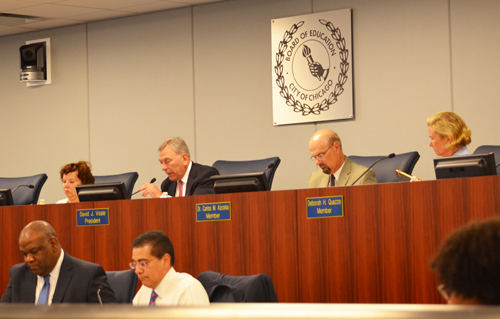 Although the seven-member Chicago Board of Education barely had a quorum at its May 27, 2015 meeting, the lack of credibility that has beset the leadership of the nation's third largest school system did not daunt them. The 300-page agenda in front of the Board was passed without discussion or debate after the removal of only one item, as the Board continued the blitzkrieg of privatization that the Board members force on Chicago based on their "Atlas Shrugged" ideology and the fact that they have the power. Above, top, left to right Mahalia Hines, Board President David Vitale, Carlos Azcoitia, and Deborah Quazzo. Foreground, James Bebley (Board's General Counsel) and Board Vice President Jesse Ruiz (currentl serving as "Interim Chief Executive Officer" while Barbara Byrd Bennett is on paid leave to deal with federal corruption charges). Substance photo by George N. Schmidt.The Chicago Board of Education held its regular monthly meeting at its headquarters at 42 W. Madison Street, just west of State Street on the morning of Wednesday, May 27, 2015. Present were Board members Dr. Mahalia Hines, Dr. Carlos Azcoitia, Deborah Quazzo, and Board President David Vitale. [img=8285]Board Vice-President Jesse Ruiz was there in his role as "Interim Chief Executive Officer (CEO)". Ruiz is substituting for CEO Barbara Byrd-Bennett, who is currently on paid leave during a federal investigation of the $20 million no-bid SUPES contract. Also present was Chief Counsel James Bebley and Honorary Student Board Member Angel Diaz. Absent were Dr. Henry Bienen and Andrea Zopp.
Although the seven-member Chicago Board of Education barely had a quorum at its May 27, 2015 meeting, the lack of credibility that has beset the leadership of the nation's third largest school system did not daunt them. The 300-page agenda in front of the Board was passed without discussion or debate after the removal of only one item, as the Board continued the blitzkrieg of privatization that the Board members force on Chicago based on their "Atlas Shrugged" ideology and the fact that they have the power. Above, top, left to right Mahalia Hines, Board President David Vitale, Carlos Azcoitia, and Deborah Quazzo. Foreground, James Bebley (Board's General Counsel) and Board Vice President Jesse Ruiz (currentl serving as "Interim Chief Executive Officer" while Barbara Byrd Bennett is on paid leave to deal with federal corruption charges). Substance photo by George N. Schmidt.The Chicago Board of Education held its regular monthly meeting at its headquarters at 42 W. Madison Street, just west of State Street on the morning of Wednesday, May 27, 2015. Present were Board members Dr. Mahalia Hines, Dr. Carlos Azcoitia, Deborah Quazzo, and Board President David Vitale. [img=8285]Board Vice-President Jesse Ruiz was there in his role as "Interim Chief Executive Officer (CEO)". Ruiz is substituting for CEO Barbara Byrd-Bennett, who is currently on paid leave during a federal investigation of the $20 million no-bid SUPES contract. Also present was Chief Counsel James Bebley and Honorary Student Board Member Angel Diaz. Absent were Dr. Henry Bienen and Andrea Zopp.
As usual, the meeting began with the "good news" ("Honoring Excellence") material, followed by lengthy presentations from Board executives using Power Point and narrative. The first "good news" topic was the honoring of debate participants. Next, students from Marshall High School who won cooking awards were honored. The students will go to Washington, D.C. next month and compete with eight other teams. One chef who won the Cooking Up Change contest tapped into her Haitian heritage with recipes for Haitian Spice Chicken, Slamming Collard Greens, and Pineapple Surprise Parfait. These items were to be served to Board members at lunch following the public meeting.
Then, Board President Vitale offered thanks to Angel Diaz for his year of service as Honorary Student Board Member. He is graduating from Curie High School this June and going on to college. He was given a commemorative gift. Interim CEO Ruiz stated that "For Angel, service is a way of life."
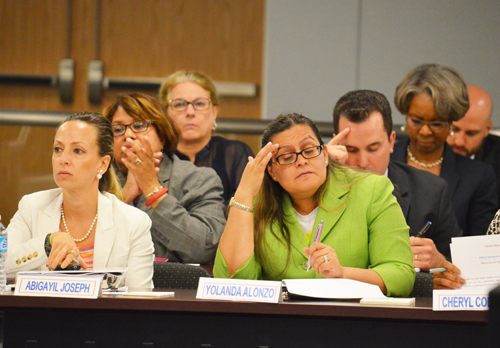 How many "Chiefs of Staff" does one big city school system require as the "Business Model" of school governance continues into its 20th year in Chicago? The actual answer is "More than 20." Above, three "Chiefs of Staff" were in the foreground during the Board of Education's May 27 meeting. Above left, Abigayil Joseph is "Chief of Staff to the Board of Education" at an annual salary of $145,000 per year. In the rear behind her (staring at the Substance camera) is Sherry Ulery, whose current title is "Chief of Staff to the Chief Education Officers" (at an annual salary of $155,000 per year). Towards the right (behind Yolanda Alonzo, is "Chief of Staff to the Chief Executive Officer" Robert Boik, who is currently being paid $165,000 per year. The Board also has other chiefs of staff, including a "Chief of Staff" to most top executives at the central office and at least one "Chief of Staff" in each of the "Network Offices" (which also have "Chiefs"). Salary and other information are available, albeit acquired with difficulty, from the Board of Education's "Position Files." Substance photo by George N. Schmidt.The business portion of the meeting was next.
How many "Chiefs of Staff" does one big city school system require as the "Business Model" of school governance continues into its 20th year in Chicago? The actual answer is "More than 20." Above, three "Chiefs of Staff" were in the foreground during the Board of Education's May 27 meeting. Above left, Abigayil Joseph is "Chief of Staff to the Board of Education" at an annual salary of $145,000 per year. In the rear behind her (staring at the Substance camera) is Sherry Ulery, whose current title is "Chief of Staff to the Chief Education Officers" (at an annual salary of $155,000 per year). Towards the right (behind Yolanda Alonzo, is "Chief of Staff to the Chief Executive Officer" Robert Boik, who is currently being paid $165,000 per year. The Board also has other chiefs of staff, including a "Chief of Staff" to most top executives at the central office and at least one "Chief of Staff" in each of the "Network Offices" (which also have "Chiefs"). Salary and other information are available, albeit acquired with difficulty, from the Board of Education's "Position Files." Substance photo by George N. Schmidt.The business portion of the meeting was next.
Interim CEO Ruiz mentioned that charter school contracts were being renewed. He stressed that choice was important to parents and that state laws require CPS to review charter school proposals. He added that charters are held to what he called "the same high standards" as regular schools without providing details. Enrollment and location are being considered on this meeting's agenda. In recent years, 70 charter schools were on the warning list and two were closed, Ruiz said.
Following Ruiz's remarks, Board executive staff began their presentations, using both narrative and Power Point. Jack Elsey, whose title is "Chief Officer of the Office of Innovation and Incubation", spoke about what he called "the charter school commitment to quality." Elsey said that charter schools will be closed after two years on a warning list. He said that "we are raising the bar and if a school does not perform, it should be closed." He also added that a summer steering committee is being formed to redefine Board policies.
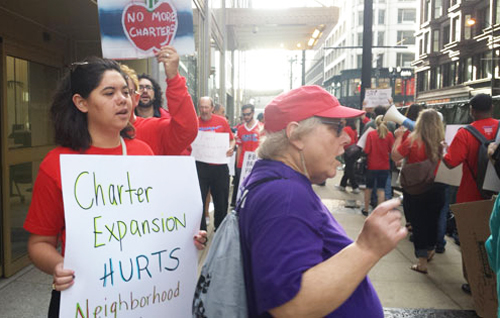 Some members of the Chicago Teachers Union demonstrated at dawn (sun rising in the background above) against the charter school expansion on the Board agenda. Only union vice president Jesse Sharkey spoke for the teachers and students during the actual meeting, which began four hours later. The union has been ignoring the Board meetings and ceding the forum provided by the meetings to charter school touts, all of whom repeat the same lurid tales of woe about the city's real public schools and then launch into their salvation narratives about how the charter schools saved their children. CTU photo.Standing with Elsey, Andrew Broy, President of the Illinois Network of Charter Schools (INCS) offered brief remarks about charter school quality from a national perspective. He said that Ohio and Arizona have weak charter schools. According to Broy, the top charter school performers are Boston, Washington, D.C., Newark, and New York. He stated that Chicago needs to increase the number of high-performing charter schools.
Some members of the Chicago Teachers Union demonstrated at dawn (sun rising in the background above) against the charter school expansion on the Board agenda. Only union vice president Jesse Sharkey spoke for the teachers and students during the actual meeting, which began four hours later. The union has been ignoring the Board meetings and ceding the forum provided by the meetings to charter school touts, all of whom repeat the same lurid tales of woe about the city's real public schools and then launch into their salvation narratives about how the charter schools saved their children. CTU photo.Standing with Elsey, Andrew Broy, President of the Illinois Network of Charter Schools (INCS) offered brief remarks about charter school quality from a national perspective. He said that Ohio and Arizona have weak charter schools. According to Broy, the top charter school performers are Boston, Washington, D.C., Newark, and New York. He stated that Chicago needs to increase the number of high-performing charter schools.
Board members were then asked to comment. Carlos Azcoitia stated that we need to look at a city-wide strategy and we need "an equal playing field."
Jack Elsey then claimed there were "high standards of quality" for all our schools, but that there was a need for clarity in the process, and a warning list that is Board policy. He stressed that charter schools should get "the help they need." He added that there is also a need for better communication.
Mahalia Hines stated that charter and neighborhood schools all serve the same communities and "share the greatness." She asked, "Why do they have to be separate?"
Jack Elsey spoke of the Leadership Program and said that one example was Knowledge is Power Program (KIPP) and Nova sharing the same building. He added that there are other examples of implementing personalized learning.
Carlos Azcoitia wanted to know if the charters are serving diverse learners and asked what are the financial penalties? He repeated his quesioin about whether CPS is meeting the need for an equal playing field with system-wide quality.
Board President Vitale said that we've made a lot of progress without noting how long Chicago has been expanding charter schools and having the same conversation about improving charter oversight every year since he began more than ten years ago as the school system's first "Chief Administrative Officer" (when Arne Duncan was still "Chief Executive Officer").
Jack Elsey answered by speaking of the charter renewals on the agenda, the longest of which is five years. He explained what most charters do to renew. He also mentioned "site visits." He added that if a charter school stays on the "level three" warning list for two years, it will be closed after the two years are up.
Responding to charges that had been made public prior to the meeting, Carlos Azcoitia then noted that the closed Peabody Middle School Branch would be used for the Rowe charter school and the main building would be used for residential use. (CPS had promised that it would never open charter schools in the 50 schools it was closing two years earlier; at the Board's May 22, 2013 meeting the Board members, all of whom were there then, had voted to close 50 of the city's real public schools, claiming financial necessity and so-called "underutilization").
Board President Vitale then reminded everyone that "we do listen here at the Board to community input."
The next Power Point and narrative came from Tim Cawley, the system's $215,000-per-year "Chief Administrative Officer." Cawley's May 27 presentations was on the Office of Information Technology Services. Without providing details, Cawley spoke of the Information Technology Goals. He said that by privatization, "we have improved quality while lowering costs." For example, he claimed, the Board was able to go from "823 printers to 97", has switched from Microsoft to Google, and that 100 percent of schools now have a fiber link to the internet and the world. He recommended approval of the proposed information technology items. The Board members sat without asking any detailed questions to Cawley, despite the fact that they had just learned -- by reading the latest expose in the Chicago Sun-Times -- that Cawley has "missed" 22 schools when he wrote the contract for Aramark for custodial services and that the "error" would cost the school system at least $10 million.
The Power Points continued...
Annette Gurley, "Chief Officer of Teaching and Learning," gave an overview of the Board's summer programs. She said that she was going to highlight the diversity of summer programs, including those that are required for students in the 3-6-8 bridge grades and additional ones that support student interests.
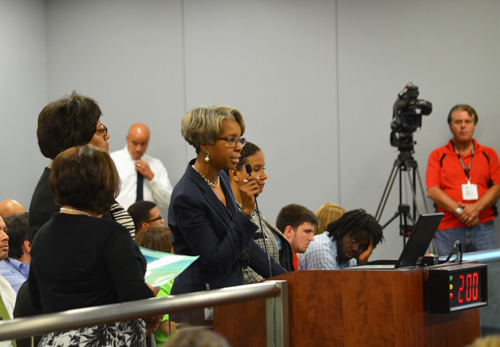 Annette Gurley, whose title is "Chief Officer for Teaching and Learning," is one of the few Chicago Public Schools executives who has actually taught in Chicago's schools. Above, Gurley is seen presenting her Power Point on summer school to the Board on May 27, 2015. The Board members have never bothered to explain their priorities, but one question the might be asked is why Tim Cawley, who has never taught in Chicago, is paid $215,000 per year as "Chief Administrative Officer" while the person in charge of the core mission of the school system, Gurley, a veteran teacher, is only paid $175,000 per year. Substance photo by George N. Schmidt.Gurley stood with others, all of whom were CPS staff. Others who were listed as helping in the Power Point presentation were Karen Garibay-Mulattieri ("Chief Officer of Language and Cultural Education"), Markay Winston ("Chief Officer of Diverse Learning Supports and Services"), and Aarti Dhupelia ("Chief Officer of College and Career Services"). An alternate staff member spoke in place of Aarti Dhupelia.
Annette Gurley, whose title is "Chief Officer for Teaching and Learning," is one of the few Chicago Public Schools executives who has actually taught in Chicago's schools. Above, Gurley is seen presenting her Power Point on summer school to the Board on May 27, 2015. The Board members have never bothered to explain their priorities, but one question the might be asked is why Tim Cawley, who has never taught in Chicago, is paid $215,000 per year as "Chief Administrative Officer" while the person in charge of the core mission of the school system, Gurley, a veteran teacher, is only paid $175,000 per year. Substance photo by George N. Schmidt.Gurley stood with others, all of whom were CPS staff. Others who were listed as helping in the Power Point presentation were Karen Garibay-Mulattieri ("Chief Officer of Language and Cultural Education"), Markay Winston ("Chief Officer of Diverse Learning Supports and Services"), and Aarti Dhupelia ("Chief Officer of College and Career Services"). An alternate staff member spoke in place of Aarti Dhupelia.
Ignoring the fact that at various times CPS has offered a variety of summer programs, Carlos Azcoitia began the Board member questions by mentioning that he liked the expansion beyond "just remediation." He implied that the new programs for advanced students and in, for example, STEM, were novelties that had never existed prior to this Board. The presentation lasted into the early afternoon.
Shortly after noon, Board President Vitale reminded the public that office hour meetings can be scheduled with Board members by calling 773-553-1600.
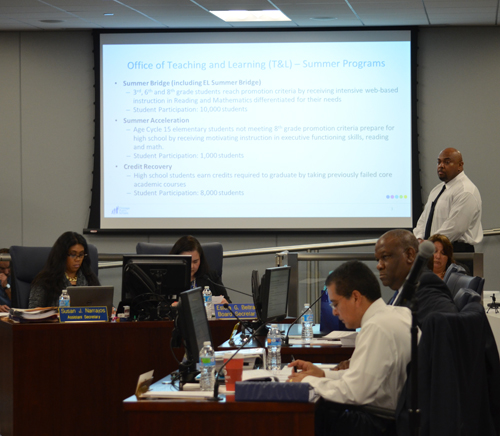 As usual, Power Point was reality for the nation's third largest school system. Above, the "Interim Chief Executive Officer" of CPS, Jesse Ruiz (white shirt, foreground, follows the Power Point detailing the number of students in summer school 2015. Substance photo by George N. Schmidt.Vitale surprised some by announcing that the next Board meeting, in June 2015, will be held on June 24th at Gwendolyn Brooks College Prep High School (250 East 111th Street). Sign-up for public participation will take place from 8 a.m. June 15th to 5 p.m. June 19th or until all 60 slots are filled.
As usual, Power Point was reality for the nation's third largest school system. Above, the "Interim Chief Executive Officer" of CPS, Jesse Ruiz (white shirt, foreground, follows the Power Point detailing the number of students in summer school 2015. Substance photo by George N. Schmidt.Vitale surprised some by announcing that the next Board meeting, in June 2015, will be held on June 24th at Gwendolyn Brooks College Prep High School (250 East 111th Street). Sign-up for public participation will take place from 8 a.m. June 15th to 5 p.m. June 19th or until all 60 slots are filled.
As the afternoon began, public participation finally started. Public participation began with Alderman Ameya Pawar of the 47th Ward, who spoke in support of Lake View,
Amundsen High Schools, and other high schools on the city's Northeast Side and in opposition to a proposal to place a "campus" of the Noble Network of Charter Schools in the area. Pewar said that he is not against Noble schools and he is not anti-charter, but that the community simply didn't need the charter and that its placement would disrupt the work of improving general high schools in the area.
Pewar spoke of 18,000 who were applying for 3,200 slots. He mentioned parents who feel that their children have to be "perfect" (to attend schools such as Northside Prep), parents who want stability and equity for their children, and families who are forced to make tough decisions for their children. He commented on his own background where under the caste system in India, his father's generation took one test that determined his entire future and how his parents chose to move to the Chicago suburbs to provide opportunities for their children that they felt were not available in their own country at that time. The Board had earlier announced that the Board Report which would have moved the Noble campus into that area had been withdrawn after the public presentation of the Agenda.
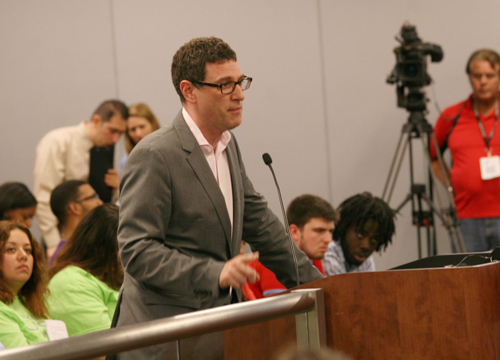 Chicago Teachers Union Vice President Jesse Sharkey spoke to the Board during the May 27, 2015 meeting. Among other things, he warned the Board that it was breaking its promise not to give away closed schools to charter schools by allocating Peabody Elementary School to a charter (on the agenda for the May 27 meeting). Sharkey noted that on the second anniversary of the massive school closings of 2013 (the Board action closing 50 schools was done at the May 22, 2013 meeting), the Board claimed that the buildings had tobe closed because they were "underutilized." He noted the hypocrisy of claiming there was no need for real public schools in some communities and then putting up additional charters. Substance photo by David Vance. Next, Chicago Teachers Union (CTU) Vice-President Jesse Sharkey, spoke. He condemned the relocation of Rowe charter school to the Peabody closed-school site. He noted that two years earlier, when the Board voted to close the unprecedented number of 50 schools, Barbara Byrd-Bennett had said that charters would not be put into closed school buldings. Sharkey noted that it was absurd to close schools to supposedly save money (which was the Board's pretext in May 2013) and then relocate charters there.
Chicago Teachers Union Vice President Jesse Sharkey spoke to the Board during the May 27, 2015 meeting. Among other things, he warned the Board that it was breaking its promise not to give away closed schools to charter schools by allocating Peabody Elementary School to a charter (on the agenda for the May 27 meeting). Sharkey noted that on the second anniversary of the massive school closings of 2013 (the Board action closing 50 schools was done at the May 22, 2013 meeting), the Board claimed that the buildings had tobe closed because they were "underutilized." He noted the hypocrisy of claiming there was no need for real public schools in some communities and then putting up additional charters. Substance photo by David Vance. Next, Chicago Teachers Union (CTU) Vice-President Jesse Sharkey, spoke. He condemned the relocation of Rowe charter school to the Peabody closed-school site. He noted that two years earlier, when the Board voted to close the unprecedented number of 50 schools, Barbara Byrd-Bennett had said that charters would not be put into closed school buldings. Sharkey noted that it was absurd to close schools to supposedly save money (which was the Board's pretext in May 2013) and then relocate charters there.
Sharkey, who was a history teacher at Senn High School before he was elected union vice president in 2010, stated that Noble Street in Uptown undermines the "fragile eco-system of schools" in that part of town. He added that the Board could do simple things: don't approve expansions, make conditions for Urban Prep (which was about to get $1 per year leases for school buildings by Board vote), and give union recognition to Urban Prep and other charter schools. Sharkey had noted that Urban Prep leaders were forcing teachers to attend anti-union meetings on school time during "PD" (Professional Development) time, which is a violation of labor law. The teachers at Urban Prep have voted to join the union, but the leadership of the charter school is fighting against unionization using tactics long polished by union busting around the USA.
The Board members had no comments or questions for Sharkey.
After Sharkey spoke, Board Secretary Estela Beltran explained the two-minute clock for public participants. Not only does the Board restrict the number of people who can speak at Board meetings, but the Board also limits each speaker to two minutes. A prominent "shot clock" (as some are calling it) is displayed on the screen to the side, a clock which counts down the seconds to zero as a speaker tries to outline issues that the public wants to bring before the Board). Beltran calls "TIME!" when the clock reaches zero, and if the speaker doesn't shut up, security pulls away the microphone and in some case drags the speaker from the podium.
Many parents made presentations in favor of charter schools at the May 27 meeting because of the proposed approval of charter school contracts which was on the Board agenda.
The first public participant to speak was Ana Martinez, who identified herself as the founding principal at "Rowe Middle School", a charter school. She spoke of developing what she called a "college and career mindset" among the young students, and that she planned night adult education classes planned at Rowe after school hours. The programs are operated by the Northwest Settlement.
Yaned Gonzalez spoke in Spanish, that was then translated, about her two children at Rowe. She asked for support of the renovation and expansion of Rowe, a "Level 1 school". Bianca Salgado spoke of wanting better than neighborhood schools for her own children.
Maria Campos, principal of Lozano, a neighborhood school which serves grades 3-8 students, told of how the well-organized school is thriving with an all-time high attendance. The school was featured on a TV program and summer programs are planned.
Sonia Lopez, assistant principal at Lozano, mentioned various programs available at Lozano: guitar lessons, dance with the Joffrey Ballet, choir, theater, world languages and weekly book clubs. None of the Board members asked any questions of the litany from the real public school in the same area as Rowe, and the agenda quickly returned to the claims of the charter school proponents who had packed the agenda. (Forty-three of the 60 spots were taken up by charter school speakers; the Board shuts off registration for the speakers after the number 60 is reaches, so it is impossible to know how many others wanted to speak but couldn't get in...). Back to charter school speakers and Urban Prep.
Ignoring the charges that Urban Prep was violating labor law by requiring teachers to attend anti union meetings on school time, Urban Prep chief Tim King said he wants the Urban Prep charter renewed and cited what he claimed were accomplishments there. He said it was the first public high school "for boys" and claimed that is is now an example of "what is possible for African-American males."
There followed a line of speakers who praised Urban Prep. Erica Johnson has a son who is a senior at Urban Prep and said that thanks to Urban Prep, her son is going to Beloit College next year. As usual, the charter school speakers talked as if no public school graduate would be going to college...
Jessie Mack spoke of mentoring students at Urban Prep after graduation.
Opening a window on to how the nation's wealthiest people are supporting the claims of the charter schools (while attacking the real public schools), student Joseph Olalusi mentioned the Gates Scholarship that will allow him to attend Cornell University in the fall. The "Gates Scholarships" are among the many examples of special privileges that private money is pouring on to Chicago's charter schools, while the general high schools are being further drained of resources.
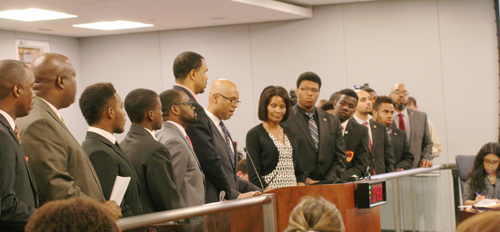 As usual, Tim King of Urban Prep repeated the charter school claims, never verified or questioned by the Board members, that everybody who graduadates from the school goes on to college. King's entourage subsequently gave the Board a rendition of the Urban Prep creed, which is recited daily at the school. Substance photo by David Vance. Next. several Urban Prep students recited the "Urban Prep Creed" in unison. Critics noted that two years earlier, the Board members (who were present up front during the time the Urban Prep Creed was being chanted) signaled security to drag away Parents4Teachers leaders Erika Clark when she tried to read the names of all the schools the Board was voting to close at its May 22, 2013 meeting.
As usual, Tim King of Urban Prep repeated the charter school claims, never verified or questioned by the Board members, that everybody who graduadates from the school goes on to college. King's entourage subsequently gave the Board a rendition of the Urban Prep creed, which is recited daily at the school. Substance photo by David Vance. Next. several Urban Prep students recited the "Urban Prep Creed" in unison. Critics noted that two years earlier, the Board members (who were present up front during the time the Urban Prep Creed was being chanted) signaled security to drag away Parents4Teachers leaders Erika Clark when she tried to read the names of all the schools the Board was voting to close at its May 22, 2013 meeting.
Vitale's and Ruiz's double standard continued.
Next were the scripted testimonies for Noble Street charter schools. Jordan McCoy said he applied to selective-enrollment schools all over the city, but was not accepted. He said a neighborhood school was not an option, without saying which neighborhood schools he was describing and why it was "not an option" for him. He then said that he went to "Chicago Bulls College Prep" (a Noble School) and found what he needed. He wants a Noble Academy built in the Uptown community.
Pablo Siera, Principal of Noble College Prep Pritzker "campus", said 69 students were accepted to the University of Illinois at Urbana and 20 were accepted at Michigan, Yale, Harvard, Northwestern, and the University of Chicago.
Elizabeth Loma, a freshman at Noble Academy spoke highly of the school and said she supports the planned Noble school.
Laura Green, a math teacher at Noble, said she had worked at the school for one year and found the school to be student-centered.
Rebecca Villegas, a graduate of Noble charters schools and the University of Illinois at Urbana, spoke of her experiences at Noble. She said she has been accepted into a program in Thailand. She also spoke in support of the proposed Noble Academy.
Those opposed to charter schools spoke next.
Michael Cohen, Amundsen High School Local School Council (LSC) Vice-chairperson, said he is opposed to the proposed West Irving Park Road location. He stated that there are no over-crowded high schools in the area and Noble would bring 900 seats to the area. He said that recruitment is taking place at the feeder schools. He said that Noble Street School should show a need, a need that is not now shown. He added that the charter school would affect school-based budgeting and that the alderman of the ward is also opposed.
Amy de la Fuente, a parent at Coonley School, spoke on behalf of the neighborhood schools and in opposition to the planned charter school in her community which has strong neighborhood schools. She said no opportunity had been provided for community input prior to this decision. She provided handouts to the Board that showed 13 years of data, including a 40% increase in graduation rates and huge increases > in Illinois State Achievement Test (ISAT) scores.
Mark Kaplan asked the Board not to allow Noble to come into their community and compete with Uplift Community High school, a neighborhood school. He stated many facts, among them the $3.9 million dollars that was given to Noble by billionaire Bruce Rauner (current State of Illinois governor).
Robert Salas, parent and LSC member at Level 1 Murphy Elementary School, provided a hand-out to the Board with information about the accomplishments at the school. He said it is a school where students can walk to school, where a grant funds band, art, and math lessons, and where the 20-year principal had recently obtained a Ph.D. He spoke in support of neighborhood schools at Irving and Addison and Kimball and Pulaski.
Then it was back to the charter school testimonials.
Rhonda Hopps runs Perspectives Charter Schools and supports the move proposed for the school. She said 100% of graduating seniors are accepted into college this year, one to Harvard. She mentioned that the current building is over 100 years old.
Sauda Porter of Perspectives claimed that the "graduation rate" had gone from "30% to 80%" and that "100%" have been accepted into college. She spoke in favor of Board support for the Perspectives move.
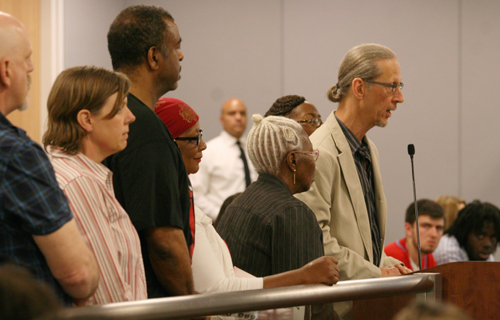 University of Illinois Professor Rico Gutstein returned to the Board to repeat the presentation from the Bronzeville community regarding the plans they developed -- over thousands of hours -- to utilize the Dyett school building, whose campus is in Washington Park. As usual, the Board members sat stonily during the presentation. Substance photo by David Vance. Next Rico Gutstein, a professor at the University of Illinois at Chicago, spoke of a coalition in Bronzeville and many alliances with organizations, such as the Botanic Garden. He mentioned the Request for Proposal (RFP) process in regard to Dyett High School. He spoke against charter schools replacing neighborhood schools and asked for open-enrollment.
University of Illinois Professor Rico Gutstein returned to the Board to repeat the presentation from the Bronzeville community regarding the plans they developed -- over thousands of hours -- to utilize the Dyett school building, whose campus is in Washington Park. As usual, the Board members sat stonily during the presentation. Substance photo by David Vance. Next Rico Gutstein, a professor at the University of Illinois at Chicago, spoke of a coalition in Bronzeville and many alliances with organizations, such as the Botanic Garden. He mentioned the Request for Proposal (RFP) process in regard to Dyett High School. He spoke against charter schools replacing neighborhood schools and asked for open-enrollment.
Lucille Reese, a charter school parent in Roseland claimed that there were no "options" for her children who could not get into selective-enrollment schools, so she chose charter schools for her children because she said she wants them to "excel, not settle."
The complexities of the UNO charter schools were on display next, although not evident to most observers. Maribel Carrasco, spoke in support of UCSN, UNO (United Neighborhood Organization) Charter School Network. Surrounded by parents wearing green tee shirts procaiming UCSN, she said she is not against any neighborhood schools, but in the past, she said, parents "did not feel any connection" to the neighborhood school while Fuentes has a personal connection to parents. She said 2,500 parents sent cards in support of the school and she loves the staff and the extra-curricular activities.
Georgina Hernandez, also of Fuentes, spoke in Spanish, which was translated.
Beatriz Zamarron, said her child meets and exceeds goals at Fuentes. She also spoke in Spanish, which was translated.
The neighborhood schools were still being defended. Next, Samuel Clendenning, a graduate of Kenwood Academy, said that district-run schools are a fundamental part of the system and should receive equitable treatment. He mentioned 95 degree heat in classrooms at a previous school. He spoke in favor of the revitalization of Dyett High School and remarked that every student and family should have access to a district-run school.
Nakia Terry, a parent at Oglesby and LSC chairperson, said she wants the Board to support the Montessori program at Oglesby. She said that there is currently a Montessori training and staff support elsewhere, but not at Oglesby.
Dr. Hines said that we will support the new principal in setting up the program.
Michael Kasang, the founder of Catalyst charter school in Austin, noted that Catalyst (no relation to the magazine) is a "Level 1 school." He spoke in favor of a five-year renewal. He said the school is affiliated with community organizations and invited Board members to Thursday concerts on campus.
Allison Jack, of INCS (the Illinois Network of Charter Schools), spoke of the charter school process and asked that we "treat all students equally." She asked that decisions be made at February meetings and decisions not be left to the last minute.
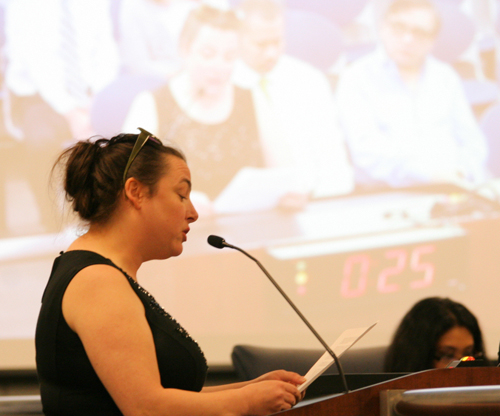 Teria Stamatis was one of several people who spoke about how the Board of Education members were deliberately neglecting the city's real public schools while voting to provide millions of dollars more to the charters. Stamtis quickly told the Board about the problems at "LaSalle II" elementary school, one of the city's highest scoring schools. Substance photo by David Vance.Teria Stamatis is a parent and P.P.O. president at "LaSalle II," a six-year old "Level 1" district-run school. Chinese is taught at the school and students go to Chile, Madrid, and France. She requested a district-run language high school for the students who have already received nine years of language instruction. She added that the parents have raised a lot of money for the school. She asked for a moratorium on charter school expansion. "Many of our district schools have great need for basic infrastructure improvement -- even our flagship magnet schools," she said. "At this time of fiscal crisis, and in the wake of 50 closed schools, I urge this Board to conserve our taxpayer dollars by improving the district-run facilities and putting a moratorium on charter expansion."
Teria Stamatis was one of several people who spoke about how the Board of Education members were deliberately neglecting the city's real public schools while voting to provide millions of dollars more to the charters. Stamtis quickly told the Board about the problems at "LaSalle II" elementary school, one of the city's highest scoring schools. Substance photo by David Vance.Teria Stamatis is a parent and P.P.O. president at "LaSalle II," a six-year old "Level 1" district-run school. Chinese is taught at the school and students go to Chile, Madrid, and France. She requested a district-run language high school for the students who have already received nine years of language instruction. She added that the parents have raised a lot of money for the school. She asked for a moratorium on charter school expansion. "Many of our district schools have great need for basic infrastructure improvement -- even our flagship magnet schools," she said. "At this time of fiscal crisis, and in the wake of 50 closed schools, I urge this Board to conserve our taxpayer dollars by improving the district-run facilities and putting a moratorium on charter expansion."
Stewart Romeo, former CPS student and South Shore resident, also requested a moratorium on charter schools. He asked that the focus be on district-run schools and more effort be put into them. He said that Kenwood Academy helped him greatly and repeated his support of district-run schools.
Public participation ended at about 1:30 p.m.
Board President Vitale asked for Board comments but there were none.
After remarking that while some said that the Board was not in support of district-run schools, Board President Vitale stated that we are in support of all - we want quality-run schools and today we are dealing with reauthorization or relocation of charter schools.
Then, Dr. Hines read the motion allowing the Board to go into closed session for the items on the Board's agenda and Board security cleared the meeting room. The actual vote the Board members took on all of the items on the "Public Agenda" (which was nearly 300 pages long) and on the items that came up during "Closed Session" (which can include personnel, real estate, and litigation) won't be public until the Board's Action Agenda appears on the CPS website during the week of June 1.
Comments:
By: Kati Gilson
BOE speakers
John, your memory is correct. Two minutes per topic. I guess charter schools don't have to follow the rules. It used to be you could sign up more people to speak and they could "donate" their two minutes to one speaker. I'm always very careful how I write my topic so I've always gotten to speak. More CPS Corruprion at its best. If this happened at work wed file an ULP - Unfair labor practice complaint.
By: Sammy Hill
Board President and Cawley Need to be replaced
I feel the board president should take the fall with BBB. He signed and led the supes deal along with the rest of the board members. Did BBB get money? Maybe that's why the Feds are on her. Also, Cawley was brought in like he was someone special. He was allowed to live outside of the city and he's the worst operations guy we've ever had. The system has gotten worse under his watch. Send him back to AUSL. The whole board needs to go. Mahalia Hines is the worst principal representative we could ever have on the Board. She is a sellout and political brown noser who has no resemblance of a former principal. She is no help at all and is actually a disgrace to principals just like Sean Stallings turned out to be. Hope was not good under her watch. Check the records. Get rid of them all.


By: John Kugler
my memory serves me right
When CPS had sign-in on the day of Board meetings. They never allowed that many speakers in the same topic. The idea was to allow different issues to get herd at the meeting. We always had to put down what we were talking about and if too many were on the same topic they would give us a 2-minute total on the topic. Seems like rules keep changing.
Oh, but let us remember the ruling class never meets to discuss and plan how to screw over the working class and poor. Never!